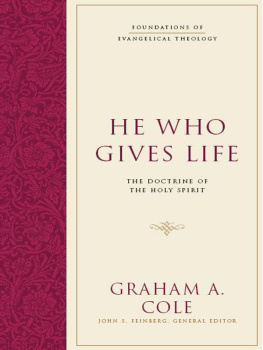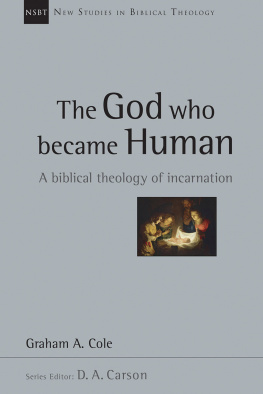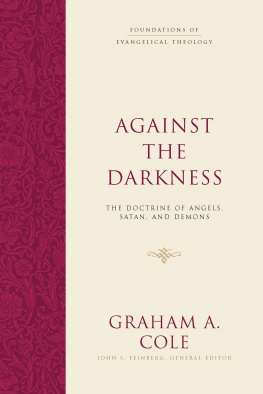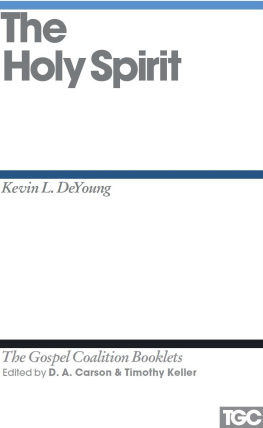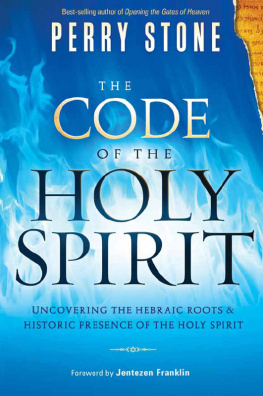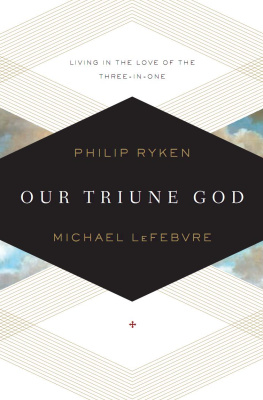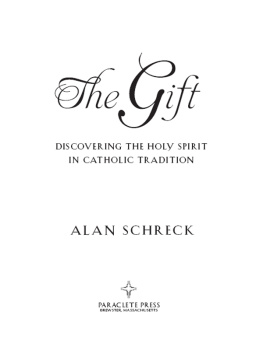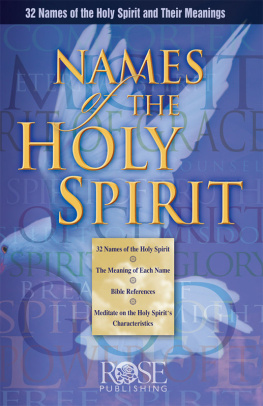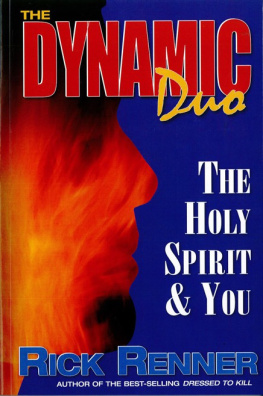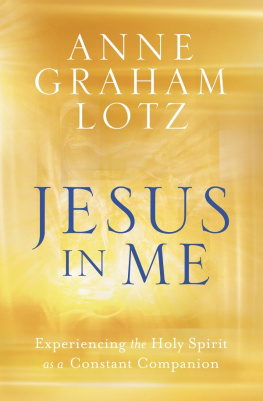Graham A. Cole - He Who Gives Life: The Doctrine of the Holy Spirit
Here you can read online Graham A. Cole - He Who Gives Life: The Doctrine of the Holy Spirit full text of the book (entire story) in english for free. Download pdf and epub, get meaning, cover and reviews about this ebook. year: 2009, publisher: Crossway, genre: Religion. Description of the work, (preface) as well as reviews are available. Best literature library LitArk.com created for fans of good reading and offers a wide selection of genres:
Romance novel
Science fiction
Adventure
Detective
Science
History
Home and family
Prose
Art
Politics
Computer
Non-fiction
Religion
Business
Children
Humor
Choose a favorite category and find really read worthwhile books. Enjoy immersion in the world of imagination, feel the emotions of the characters or learn something new for yourself, make an fascinating discovery.
- Book:He Who Gives Life: The Doctrine of the Holy Spirit
- Author:
- Publisher:Crossway
- Genre:
- Year:2009
- Rating:4 / 5
- Favourites:Add to favourites
- Your mark:
- 80
- 1
- 2
- 3
- 4
- 5
He Who Gives Life: The Doctrine of the Holy Spirit: summary, description and annotation
We offer to read an annotation, description, summary or preface (depends on what the author of the book "He Who Gives Life: The Doctrine of the Holy Spirit" wrote himself). If you haven't found the necessary information about the book — write in the comments, we will try to find it.
He Who Gives Life: The Doctrine of the Holy Spirit — read online for free the complete book (whole text) full work
Below is the text of the book, divided by pages. System saving the place of the last page read, allows you to conveniently read the book "He Who Gives Life: The Doctrine of the Holy Spirit" online for free, without having to search again every time where you left off. Put a bookmark, and you can go to the page where you finished reading at any time.
Font size:
Interval:
Bookmark:
This latest addition to the Foundations of Evangelical Theology series maintains the high standard already set. Graham Cole has written the widest-ranging textbook on pneumatology that currently exists. Meticulous and sharp in handling texts, and scrupulous on matters of method, he offers us cool, clear, sober answers to more questions about the Holy Spirit than probably any of us have hitherto thought to ask. New ground is not broken, but solid ground of a mainstream Reformed sort is set forth throughout. Well done, Dr. Cole!
J. I. Packer, Professor of Theology, Regent College
Dr. Graham Coles superbly written book is a wide-ranging biblical and theological study of the doctrine of the Holy Spirit that may well become a standard work on the subject. The volume is marked by careful exegesis of the scriptural references to the Spirit, each of which is interpreted within the salvation-historical flow of Gods redemptive purposes. A convinced Trinitarian theologian, Dr. Cole listens carefully to the contributions made by earlier generations of Christian writers from a range of disciplines, including biblical studies, systematic theology, and historical theology. Authors from both the Eastern and Western traditions are drawn in as pertinent, and challenging questions for our generation are raised. Issues of doctrine, understanding, and experience are drawn together in this fine book as the author guides his readers in appropriate worship of the Triune God, Father, Son, and Spirit.
Peter T. OBrien, Senior Research Fellow in New
Testament, Moore Theological College, Australia
HE WHO
GIVES LIFE
Foundations of Evangelical Theology Series
JOHN S. FEINBERG, GENERAL EDITOR
The Cross and Salvation
BRUCE DEMAREST
No One Like Him
JOHN S. FEINBERG
To Know and Love God
DAVID K. CLARK

He Who Gives Life: The Doctrine of the Holy Spirit
Copyright 2007 by Graham Arthur Cole
Published by Crossway Books
a publishing ministry of Good News Publishers
1300 Crescent Street
Wheaton, Illinois 60187
All rights reserved. No part of this publication may be reproduced, stored in a retrieval system, or transmitted in any form by any means, electronic, mechanical, photocopy, recording, or otherwise, without the prior permission of the publisher, except as provided for by USA copyright law.
First printing 2007
Printed in the United States of America
Scripture quotations marked ESV are from The Holy Bible, English Standard Version, copyright 2001 by Crossway Bibles, a publishing ministry of Good News Publishers. Used by permission. All rights reserved.
Scripture references marked NIV are from The Holy Bible: New International Version. Copyright 1973, 1978, 1984 by International Bible Society. Used by permission of Zondervan Publishing House. All rights reserved.
The NIV and New International Version trademarks are registered in the United States Patent and Trademark Office by International Bible Society. Use of either trademark requires the permission of International Bible Society.
Scripture references marked NRSV are from The New Revised Standard Version. Copyright 1989 by the Division of Christian Education of the National Council of the Churches of Christ in the U.S.A. Published by Thomas Nelson, Inc. Used by permission of the National Council of the Churches of Christ in the U.S.A.
All emphases in Scripture references have been added by the author.
ISBN 13: 978-1-58134-792-0
ISBN 10: 1-58134-792-8
Library of Congress Cataloging-in-Publication Data
Cole, Graham A. (Graham Arthur), 1949
He who gives life : the doctrine of the Holy Spirit / Graham A. Cole.
p. cm.(Foundations of evangelical theology)
Includes bibliographical references (p. ) and indexes.
ISBN 978-1-58134-792-0 (hc)
1. Holy Spirit. I. Title. II. Series.
BT121.3.C65 2007
231.3dc22
2007005060
LB 15 14 13 12 11 10 09 08 07
14 13 12 11 10 9 8 7 6 5 4 3 2
To my wife, Jules,
a bright patch of Aussie sunlight
CONTENTS
PART ONE:
THE MYSTERY OF THE SPIRIT
PART TWO:
THE MINISTRY OF THE SPIRITOLD TESTAMENT
PERSPECTIVES
PART THREE:
THE MINISTRY OF THE SPIRITNEW TESTAMENT
PERSPECTIVES
PART FOUR:
THE MAGNIFICENCE OF DIVINE SELFLESSNESS
W hy another series of works on evangelical systematic theology? This is an especially appropriate question in light of the fact that evangelicals are fully committed to an inspired and inerrant Bible as their final authority for faith and practice. But since neither God nor the Bible changes, why is there a need to redo evangelical systematic theology?
Systematic theology is not divine revelation. Theologizing of any sort is a human conceptual enterprise. Thinking that it is equal to biblical revelation misunderstands the nature of both Scripture and theology! Insofar as our theology contains propositions that accurately reflect Scripture or match the world and are consistent with the Bible (in cases where the propositions do not come per se from Scripture), our theology is biblically based and correct. But even if all the propositions of a systematic theology are true, that theology would still not be equivalent to biblical revelation! It is still a human conceptualization of God and his relation to the world.
Although this may disturb some who see theology as nothing more than doing careful exegesis over a series of passages, and others who see it as nothing more than biblical theology, those methods of doing theology do not somehow produce a theology that is equivalent to biblical revelation either. Exegesis is a human conceptual enterprise, and so is biblical theology. All the theological disciplines involve human intellectual participation. But human intellect is finite, and hence there is always room for revision of systematic theology as knowledge increases. Though God and his Word do not change, human understanding of his revelation can grow, and our theologies should be reworked to reflect those advances in understanding.
Another reason for evangelicals to rework their theology is the nature of systematic theology as opposed to other theological disciplines. For example, whereas the task of biblical theology is more to describe biblical teaching on whatever topics Scripture addresses, systematics should make a special point to relate its conclusions to the issues of ones day. This does not mean that the systematician ignores the topics biblical writers address. Nor does it mean that theologians should warp Scripture to address issues it never intended to address. Rather it suggests that in addition to expounding what biblical writers teach, the theologian should attempt to take those biblical teachings (along with the biblical mind-set) and apply them to issues that are especially confronting the church in the theologians own day. For example, 150 years ago, an evangelical theologian doing work on the doctrine of man would likely have discussed issues such as the creation of man and the constituent parts of mans being. Such a theology might even have included a discussion about human institutions such as marriage, noting in general the respective roles of husbands and wives in marriage. However, it is dubious that there would have been any lengthy discussion with various viewpoints about the respective roles of men and women in marriage, in society, and in the church. But at our point in history and in light of the feminist movement and the issues it has raised even among many conservative Christians, it would be foolish to write a theology of man (or, should we say, a theology of humanity) without a thorough discussion of the issue of the roles of men and women in society, the home, and the church.
Next pageFont size:
Interval:
Bookmark:
Similar books «He Who Gives Life: The Doctrine of the Holy Spirit»
Look at similar books to He Who Gives Life: The Doctrine of the Holy Spirit. We have selected literature similar in name and meaning in the hope of providing readers with more options to find new, interesting, not yet read works.
Discussion, reviews of the book He Who Gives Life: The Doctrine of the Holy Spirit and just readers' own opinions. Leave your comments, write what you think about the work, its meaning or the main characters. Specify what exactly you liked and what you didn't like, and why you think so.

